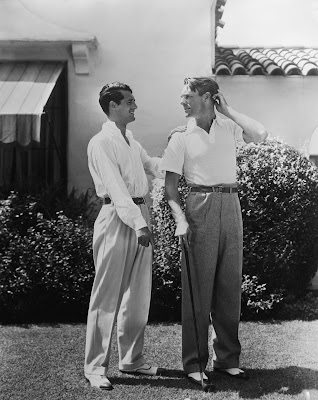Cary Grant and Randolph Scott
Cary Grant & Randolph Scot share an intimate moment outside their Santa Monica beach house (1930s).
Though he married women five times, movie star Cary Grant (1904-1986) enjoyed many gay relationships during his early career in New York and Hollywood. His most famous same-sex romance was with fellow actor Randolph Scott (1898-1987), the rugged star of numerous westerns.
Grant and Scott met at Paramount Studios in 1932 and were immediately attracted to each other. Soon after, they moved in together, sharing a house at 2177 W. Live Oak Drive near Griffith Park in Hollywood. The arrangement was explained away by studio public relations agents as a way for two young actors to “cut costs and share expenses,” even though both men could easily afford their own homes. Even after Grant’s studio-arranged marriage to Virginia Cherrill, the two men continued to bear a torch for each other; just a few months into Grant's marriage, he attempted suicide. After a 13-month marriage, in a 1935 divorce settlement, Cherrill received $50,000, which was equivalent to 50% of their community property at the time. Grant moved back in with Scott.
Randolph Scott

Randolph Scott (above), beyond handsome.
Between liaisons with other men and women, Grant and Scott’s relationship endured, well known to their colleagues in the industry. In the late 1930s, Grant and Scott occupied a Santa Monica beach house at 1019 Ocean Front (since renumbered – now 1039). In fan magazines, they were photographed together in domestic bliss, wearing aprons and cavorting pool side or on the patio. According to Grant’s biographer, they believed their public openness and flamboyance would raise them above suspicion of homosexuality. The public bought it, and Grant enjoyed a screen career as a suave ladies’ man for the next three decades, while Randolph Scott made popular westerns, always playing rugged, masculine characters.
Don’t miss My Favorite Wife (1940 - available from NetFlix), a film featuring Grant and Scott as co-stars in a screwball comedy. In this trailer for the movie, Scott appears with Cary Grant at the 1:45 mark.








